
Here we go: The next Read America Read Project is April 26th.

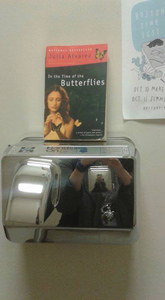
Leave a book for someone to take anywhere you want. This time, ask two people you know to do this also. This way the project
will grow each month. I would like a book marker to go in every book so people know where they are
coming from. Thank you for being a part of this project.
Lets make April 26th great! Send me photos too. I have a list of names of who
participated and as this grows, keep letting me know you are doing this. Thanks a zillion.
You all rock. Lets get America reading!!!!
e-mail: gloria@read-america-read.org
Thanks so much,
Gloria
|

Coming in October 2025: My Way Home by Mary Bonina
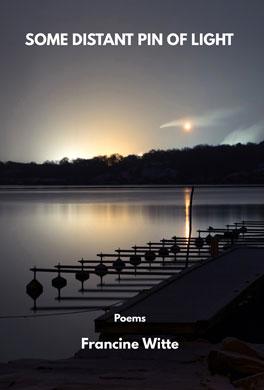
Francine Witte is an award-winning poet, flash fiction writer,
and playwright. She is the author of 12 books of poetry and flash
fiction and her work has appeared in numerous journals and
anthologies. She is a native New Yorker and attends and produces
poetry events in the vibrant NYC scene. She is the co-host and
co-curator of the online reading, The Prose Garden. She is the
flash fiction editor for FLASH BOULEVARD and South Florida
Poetry Journal. A former high school English teacher, she now
leads writing prompt sessions on zoom. Witte holds an MFA in
Creative Writing/Poetry from Vermont College and an MA from
SUNY Binghamton. Visit her website at francinewitte.com.
Francine Witte newest poetry collection Some Distant Pin of Light is an exploration of life's fleeting moments, capturing the
essence of human emotion with lyrical precision. Her poems delve into themes of love, loss, and the passage of time, blending
vivid imagery with evocative language. Each piece is a snapshot of everyday experiences, transformed into profound reflections
on the human condition. As with her previous collections, Café Crazy and The Theory of Flesh, these pages are filled with lost
lovers, nostalgic family portraits, and her deep concern for the environment. Witte's keen observational skills and masterful
use of brevity create a tapestry of interconnected vignettes that resonate deeply with readers.
Gregor Samsa woke up as a huge insect in a bourgeois bed, struggling to make sense of what has happened to him and what he can
do about it. Among her many story-telling bursts of brilliance, Francine Witte contemporizes the Kafkaesque shock of being
slapped in the existential face, offering up modern perplexities that are familiar as they are strange. A woman finds
herself among many middle-aged women in a grocery shop, 'wheeling their girliness around in a shopping carts... (to the) burst
of corn pops and leprechauns winking.' A man finds himself trapped in an oceanic human wave, aching to break past his
'beach-locked future' and make connection to the 'distant pin of light' from which he came. There's humor and
metaphorical pathos aplenty in this fine collection — from men who can play themselves backwards, to prove that
Paul is dead, to a self-declared 'map of me' that would drive you into a lake if you tried to navigate by it.
This is smart stuff, New York City smart, memorably smart. Tales told to
the tune of the underground thrum which goes beyond the play of good story-telling to a
place of reawakening. These are poems to match the beat of a reader's heart — the heart
which is 'the acorn inside the tree you have turned into.'
—George Wallace, Walt Whitman Birthplace
The poems in Some Distant Pin of Light consider how to exist, even thrive, in a world where
"the news gets worse/each day." Witte's speakers contemplate the past even as they look forward,
look up and consider the sun, the titular "distant pin of light," imagine finally that
"billions of miles/away, maybe someone is wishing on it,/wishing for a last desperate chance at love."
With her trademark, vivid imagery, Witte captures both the intimate details of everyday life and the
cosmic scale of existence, grounding ontological questions in concrete experiences. This is one stellar
collection by a writer at the height of her powers.
—Sarah Freligh, author of Sad Math
The book starts out with a Map of Me, "Let’s start by saying this isn’t//A map you'd fold up in a glove
box//or pull up on a GPS" guiding the reader into a room of observant wit,
which takes center stage... These poems bring the reader wandering through a hushed room of the past: each
poem is a relic of art that stands still in time. To observe them in their resting places, a past we cannot
change, ends with hope: the last piece, turns our attention to the future in Our Star, where a billion mile
lover, which doubles for a wave, "aching to break past his own beach-locked//future, finally able to get
whatever he could//wish for on some distant pin of light." This collection of poetry is a true joy to explore.
—Jennifer Juneau, author of More Than Moon
$18.00 | ISBN: 978-1-950063-90-1 | 71 Pages
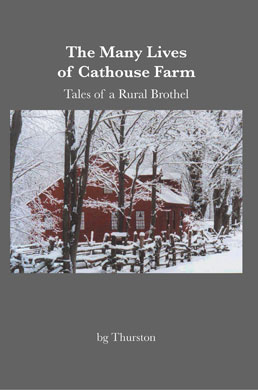
bg Thurston lives with her husband on a sheep farm in Warwick, Massachusetts. After a career in computers and finance, she received
her MFA in Poetry from Vermont College in 2002. She has taught poetry courses at Lasell Village, online for Vermont College, and
conducts poetry workshops. Her first book, Saving the Lamb, by Finishing Line Press was a
Massachusetts Book Awards highly recommended reading choice. Her second book, Nightwalking, was released by Haleys in 2011.
Her third book, The Many Lives of Cathouse Farm/Tales of a Rural Brothel, is the culmination of a decade of historical research about
her 1770's farmhouse.
The Many Lives of Cathouse Farm/Tales of a Rural Brothel is the culmination of a decade of research into the 250-year
history about the farm where the author has lived since 2000. The book contains historical facts and poetic musings
about many of the inhabitants who have lived on the farm from 1770 to present. The small farmhouse is the original cape
dwelling built in 1770 by two Revolutionary War soldiers from the Weeks Family and farmed by four subsequent generations.
During the Prohibition era, the farmhouse was maintained as part of a rural brothel that continued to operate until the
late 1940's. Presently Cathouse Farm is also home to sheep, chickens, dogs, and of course, many cats.
The Many Lives of Cathouse Farm — Tales of a Rural Brothel, a finely-crafted collection of poems giving voice to a 255-year-old
farmhouse and its surprising history—and to the people and animals who have lived there since before the American Revolution.
"We search all our days / for a place called home," Thurston observes, charting in meditative and musical tones the universal
human need for rootedness and connection. In tracing the loves and losses of those who came before us—and our own part in the
great drama—she reminds us that even if our name be recorded at the Registry of Deeds, we are really no more than caretakers,
tenants, and that love grows in the soil and souls of those who paint clapboards and trim, plant flowers and water them,
wander the pastures and woods of the world.
—David Thoreen, Assumption University
This compelling and singular collection is an expert weaving of history and poetry. The story of Cathouse Farm begins when
poet bg Thurston spies "a small red farmhouse nestled behind tall sugar maples" which beckons her with its For Sale sign.
Images presented throughout these pages elucidate Thurston's narrative of dwelling and landscape. We listen as the very
house itself speaks in "Sister Houses, 1771" and "The Ruined House" and hear occupants, such as Sarah Weeks, who
"labored long for all / these years on this forlorn farm, / birthed and buried our babies- / once within the same week."
Section 3 links us to Prohibition-era owner George F. Rivers, who "set the property up as a speakeasy and rural brothel"
and inspired persona poems that do not look away from these women's struggles. This book is a significant and fascinating
accomplishment, full of curiosity, empathy and respect for the ghostly inhabitants of Cathouse Farm.
—Judith Ferrara, A Feast of Losses: Yetta Dine and Her Son, Stanley Kunitz
The 1700's house speaks in tongues. Laths, horsehair plaster, hand-forged nails, wide pine boards; it holds hardscrabble
lives filled with sounds of sweeping, smells of bread and woodsmoke, cries of children. bg Thurston, in
The Many Lives of Cathouse Farm — Tales of a Rural Brothel, listens and gives voice to those who have lived
and died in this house, her home. As Winfield Scott Weeks, of the poem "The Lost Boy," knows:
"Some souls stay tethered to a place." bg understands that "Loss / is a language all its own." but life continues
and, in this life, we are joined with those who have died before us, like Billie, "the last lady." In
"Gardening with Billie," Thurston writes: "We are joined by what we plant, hands / dug deep in this soil that grew crops /
and cows for two hundred years." Their lives restored through careful research, those who opened the doors to
Cathouse Farm welcome us home.
—Susan Roney O’Brien, Thira and Bone Circle
$18.00 | ISBN: 978-1-950063-33-8 | 66 Pages
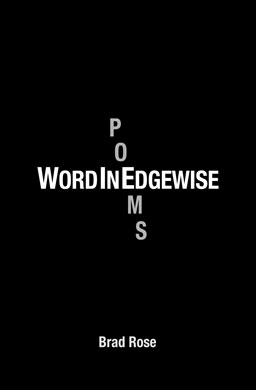
Brad Rose was born and raised in Los Angeles, and lives in
Boston. He is the author of five collections of poetry and
flash fiction: Lucky Animals, No. Wait. I Can Explain, Pink
X-Ray, de/tonations, and Momentary Turbulence. Seven times
nominated for a Pushcart Prize and three times nominated for
the Best of the Net Anthology, Brad's poetry and fiction have
appeared in Los Angeles Times, The American Journal of Poetry,
New York Quarterly, Puerto del Sol, Clockhouse, Folio, Cloudbank,
Baltimore Review, 45th Parallel, Best Microfiction 2019, Lunch
Ticket, Sequestrum, Unbroken, Right Hand Pointing, and other
publications. Brad is also the author of seven poetry chapbooks,
among them Democracy of Secrets, Collateral, An Evil Twin is
Always in Good Company, and Funny You Should Ask. His website
and blog can be found at bradrosepoetry.com.
The poems and microfiction of WordinEdgeWise, are predominately surreal and playful. Many are unified by the quirky
voices of hardscrabble speakers who have experienced social and economic turmoil, and a resulting psychic instability.
Via interior monologues and uncanny dialogues, speakers take liberties with standard colloquial speech, invent unusual
similes, and employ unconventional variants of American idioms. They also offer startling insights and unexpected
moments of wisdom. Both in spite of, and because of, speakers' peculiarities, the poems and
microfiction of No. Wait. I Can Explain. seek to offer keen, if unsettling, glimpses into the
darker—and often darkly humorous—underlying dimensions of contemporary American life.
Brad Rose's WordinEdgewise displays the madcap features that readers have come to relish in his work—fast-talking,
unreliable narrators and surreal situations depicted with brittle sympathy and manic humor. When it comes to prose poetry,
Brad Rose plays, to borrow his own phrase, "first violin in the orchestra of the absurd."
—Howie Good, author of Famous Long Ago and The Bad News First
WordinEdgewise, poet Brad Rose's most recent collection, is as high energy as the title advertises. This
language-driven tour de force leaves the reader breathless, from line to line and poem to poem, as the
speaker explicates on everything from blind dates to mobile homes, from lightning to ghosts. In this world,
blind dates are lightning and mobile homes and ghosts, as the author makes expert use of such literary
devices as chiasmus and zeugma to bring it all together. Each poem is a glittering tautology, each line
disparate in its sameness. The pace of this book is addicting, and you will pick it up over and over again
to the delight of your senses.
—Ralph Pennel, author of A World Less Perfect for Dying In, and fiction editor of Midway Journal
Brad Rose: master of the synaptic leap. He unearths suppressed premises (hidden in stark sight thanks to our
jones for consensus reality), leading us to the inevitable across no matter how many unexpected ceiling tiles.
Multiple vectors are at subcutaneous work here, clause by clause. These paragraphs are like incognito erasure
poems, extended family trees with insoluble fan charts. "When I was counting backward in dog years, the judge
sentenced my jury to another week of hard labor." Yes, ordinary life is exactly like this. We just need
reminders.
—David P. Miller, author of Bend in the Stair and Sprawled Asleep
Cover: Hannah Rose
$19.95 | ISBN: 978-1-950063-69-7 | 108 Pages
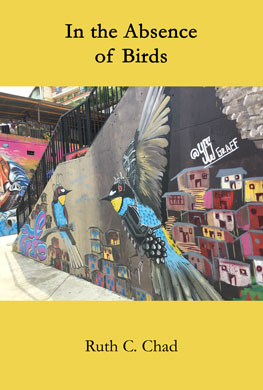
Ruth C. Chad is a psychologist who lives and works in the
Boston area. Her poems have appeared in the Aurorean,
Connection, Psychoanalytic Couple and Family Institute of New
England, Constellations, Ibbetson Street, Montreal Poems, Muddy
River Poetry Review, Lily Poetry Review, Amethyst Poetry
Review, Writing in a Woman's Voice, and others. Her chapbook,
"The Sound of Angels," was published by Červená Barva Press
in 2017. Ruth was nominated for a Pushcart prize in 2021.
The lyrical and powerful poetry in this book addresses the complexity of family life, grief, loneliness and
communion. Many of the poems convey the poet’s urgency to notice and appreciate the richness of nature and the
sadness of watching its demise. "In the Absence of Birds" brims with personal and universal poetry, offering
insight and solace.
Ruth Chad's In The Absence of Birds relates on many levels. It cuts to the chase. She is fragile yet blunt,
as she draws us into her world with poetry that exudes emotion and expresses her lamentations. With the keen
sensitivity of a psychologist she delves beneath the surface of family life, death and nature. She opens
herself to the reader in the manner of other fine women poets: Plath, Oliver and Dove. Ruth Chad is a poet
worth careful reading.
—Zvi A. Sesling, Author of War Zones and the Lynching of Leo Frank
In the Absence of Birds is a breakthrough work, imbued with a relevance far beyond the usual audience for
21st century poetry. The poet's commitment to authenticity shines through in her creative approach to
grief; her persistent theme of nature-as-solace; and a gentle, dark wit that finds something enviable
in wildness. If there is an opposite of "overwrought," that is Ruth Chad's style: her beautiful,
clean syntax and simple lines create a welcoming space, inviting the reader to linger, and fill in
the spaces with feeling.
—Eric Hyett, Poet and Translator
Ruth Chad chooses her words with great care to create gem-like poems—although gems are cool and hard,
her poems are warm and full of heart. They are also full of sensual detail, ranging across life
experiences from peeling a ripe plum to watching her mother fade away in a nursing home. Whatever the
situation, simple or profound, Ruth draws us right into it with her, generously sharing what she sees,
hears, smells, tastes and feels, compelling us to experience it with her. In the Absence of Birds is a
feast.
—Lawrence Kessenich, Winner of Ireland's Strokestown International Poetry Prize
Cover Image: Ruth Chad
$19.95 | ISBN: 978-1-950063-98-7 | 102 Pages

Republic of North Macedonia
Borche Panov was born on September 27, 1961 in Radovish,
Republic of North Macedonia. He graduated from the "Sts. Cyril
and Methodius" University of Skopje, Faculty of Filology in the filed
of Macedonian and South Slavic Languages in 1986. Panov has been
a member of the Macedonian Writers' Association since 1998. He
published 15 poetry books and 8 plays in Macedonian language.
He has also published poetry books in other languages: "Hematite
particles" (2016 - in Macedonian and Bulgarian and "Photostiheza"
2019, Bulgaria), "Vdah" in Slovenian (2017, Slovenia), "Shaving
balloon" in Serbian (2018, Serbia), "Blood that juggles 8000 poetic
thoughts" in Croatian (2021, Croatia), "Underground Apple" in
Arabic language (United Arab Emirates, 2021), "Underground
apple" in English (Netherlands, 2021), "Dandelion Cadence" in
English (co-author, India, 2021), "Sculpture of Breathing" in Italian
and English (2022, Italy), "The Morning Line" in Romanian (2023,
Romania). His poetry has been translated into 40 languages and
published all around the world. He received many literary awards
such as the following: Premio Mondiale "Tulliola-Renato Filippelli"
in Italy for his book "Shaving the Balloon" (2021), "City of Galateo-
Antonio De Ferraris" (Italy, Rome, 2021), Premio "Le Occasioni" in
Italy, the Sahito World Literary Award in 2021, Predrag Matvejevic
in Croatia for his book "Shaving Balloon," Naji Niman Award in
2022. He has edited many poetry books and poetry anthologies and
has launched many authors and books published in Macedonia. He
also translates poetry from Macedonian into Serbian and Croatian
language and vice versa. Panov works as a Counselor for Culture and
Education at the Municipality of Radovish, and he is also a president
of the program board of the "International Karamanov's Poetry
Festival" for more than 20 years.
ABOUT THE TRANSLATOR
Daniela Andonovska-Trajkovska (1979, Bitola, Republic of North
Macedonia) is a poetess, author, scientist, editor in chief of two
literary magazines in North Macedonia, literary critic, doctor of
pedagogy, university professor at the University "Kliment Ohridski"
Bitola (Faculty of Education), a member of the Macedonian
Writers' Association; Macedonian Science Society - Bitola; Slavic
Academy for Literature and Art in Varna - Bulgaria, and Bitola
Literary Circle. She was president of the Macedonian Science
Society Editorial Council and now - a head of the Linguistics and
Literature Department at the Macedonian Science Society - Bitola.
She has published two books of stories, 9 poetry books, one book for
children, a book of literary criticism in Macedonian and 3 academic
and scientific books that are part of the curriculum at the university
where she works, and over 100 scientific articles. She has also 6 poetry
books published in English, Italian, Arabic and Romanian language
in India, United Arab Emirates, Italy, and Romania. She has also
published her translations from English into Macedonian and vice
versa in North Macedonia, Italy and Netherland (7 poetry books and
many articles). She has won several important awards for literature:
"Krste Chachanski" (2018); "Karamanov' for "Electronic Blood"
(2019); Macedonian Literary Avant-garde for "House of Contrasts"
(2020); "Abduvali Qutbiddin" (2020, Uzbekistan); Premio Mondiale
"Tulliola-Renato Filippelli" in Italy for "Electronic Blood" (2021);
Award of excellence "City of Galateo - Antonio De Ferrariis" (Italy);
Award for Literary Criticism in 2022, Poetry Award "Dritero Agioli"
(Albania, 2023); Poetry Award "Mihai Eminescu," a Golden Medal
and a recognition as ambassador of culture in Romania by the Mihai
Eminescu Academy (2023) and "Aco Shopov" for poetry (the most
important national poetry prize by Macedonian Writers' Association
in 2021). Her poetry has been translated and published into more
than 40 world languages.
Cover Art: "Tower of Babel" by Witold Zakrzewski
$21.95 | ISBN: 978-1-950063-83-3 | 118 Pages
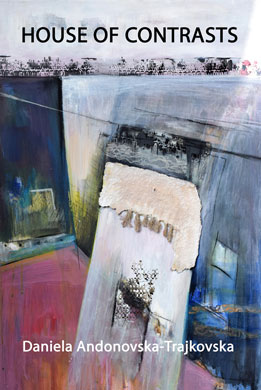
Daniela Andonovska-Trajkovska (1979, Bitola, North Macedonia) holds PhD in Education. She is an awarded poetess,
writer, scientist, literary critic, translator, editor, full professor at the University "St. Kliment Ohridski" in Bitola,
co-founder of the Center for Literature, Art, Culture, Rhetoric and Language at the Faculty of Education in Bitola,
a member of the Macedonian Writers' Association, Slavic Academy for Literature and Art in Varna, and a head of
the Literature and Linguistic Department (Macedonian Science Society in Bitola). She has authored 16 books
in Macedonian (poetry, prose, literary criticism, scientific books), 6 poetry books in English, Arabic,
Italian, and 9 poetry books of renowned world poets in her translation. Her poetry is
translated into 40 languages.
DESCRIPTION BY BORCHE PANOV, literary critic, poet, editor:
"In the poetry book "House of Contrasts" by Daniela Andonovska-Trajkovska somewhere at the beginning we can read that
"a tear without metaphysics has no aesthetics." This discourse completely determines the poetics of this very
well-known and notorious Macedonian poetess. She is awake in each word and in this book, she creates her poetic
alphabet by freezing the moment and by claiming that her alphabet was born on the knife with which the umbilical cord was cut.
Although, she writes about things that are not so perfect or beautiful, such as the pain and the loss, she is always on
the bright side by using the poem as the most subtle defense of life. At the same time, she stands in front of the
vertical mirror of love and she confronts us with the naked truth by showing us the finest lines on our faces from
which time rises like a wall between us and the world. She makes us to be aware that we live in a room of the
autistic time, and even when insomnia speaks loudly, no one can hear the fractures of the day that assembles in us
piece by piece like in an X-ray image, and no one can see our nakedness and our vulnerability. We hide behind the
image that we show to the world wanting to be accepted and appreciated.
In the poetry book "House of Contrasts" we see for a moment the world in which every night, humans made of paper
return to the keyhole of their houses cursing the day that does not last long enough so they could find themselves.
But that is precisely why the day in this book lasts long enough to see how the poetess
Daniela Andonovska-Trajkovska shows us that the paramecium of the meaning develops into a multicellular
organism breathing with human lungs in the chest of the readers."
DESCRIPTION BY SLAVICA GADZOVA SVIDERSKA, PhD, literary critic, poetess, editor, publisher:
"The poetry of Daniela Andonovska-Trajkovska is powerful and striking example of Écriture feminine, which is essentially
atypical and non-classical, because the prism of this author goes beyond the classical framework of the so-called
writing from the womb. Searching for the perfect and most appropriate way of expressing her view and thinking about the
world, the author playfully moves between the forms and ways of poetic expression: from short elliptical poems
reduced to simple but semantically layered poetic images, through lyrical poems that are thought provoking, to poems where
the verse hybridizes with the narrative tone. At the beginning, the lyrical subject searches for itself
(in the world, through the Other and in the Other, in the rational and the irrational, in the
real and the oneiric), and the most appropriate form to express this search is the paradox. Furthermore, the search
is an endless attempt to find harmony and balance amidst the noise of a world that is becoming increasingly chaotic,
illogical, and sometimes nightmarishly phantasmagoric. At the end the search for the metaphysical vertical takes
place, a search for the eternal, for the Absolute, for God. The decadence, the downward movement and the erosion of the values
are constantly semantically emphasized: the images are broken, the words are crashed, the breathing is trapped, the
woman is a doll with winded up steps, the face is a salt mosaic, ethics is "Cain-ethics," that is, the world is
"on red alert." Nevertheless, the lyrical subject knows how to find meaning even in the era of
meaninglessness, living its search for itself, for a perfect understanding with the Other, for a home without
contrasts and for the Absolute. Andonovska-Trajkovska's poetry brings fresh and original voice that carries the
archetypal one, thick semantics, explosions of meanings, feminine wisdom and aesthetics that
ennoble the "collapsing world" so that it does not collapse. For that reason, the poetry book "House of Contrasts"
deserves a special place in the contemporary world literature."
"Daniela Andonovska-Trajkovska's poetry brings fresh and original voice that carries the archetypal one,
thick semantics, explosions of meanings, feminine wisdom and aesthetics that ennoble the "collapsing world" so
that it does not collapse. For that reason, the poetry book "House of Contrasts" deserves a special place in the
contemporary world literature."
—Slavica Gadzova Sviderska, PhD, literary critic, scholar, poetess, editor, publisher
"In "House of Contrasts" by Daniela Andonovska-Trajkovska the silence is not silent, but dramatical and loud.
It seems that here is a compromise and an awareness that the antonymies are compatible contradictions like the
day and the night, the sky and the earth, the angel and the devil, the cosmos and the chaos. Like ying
and yang. Like life."
—Jordan Stojanoski, PhD, literary critic, university professor of literature
Cover art: Ljupka Galazkava-silev
$19.95 | ISBN: 978-1-950063-84-0 | 92 Pages
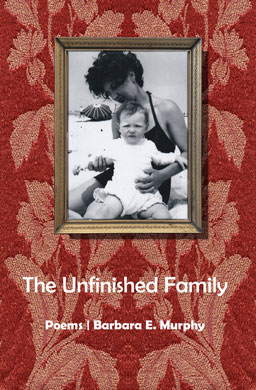
Barbara E. Murphy's poetry has appeared or is forthcoming in
journals including Green Mountains Review, Threepenny Review,
Barrow Street, and New England Review. She is a recipient of a
Vermont Arts Council Fellowship and twice-nominated for a
Pushcart Prize. Murphy served as a faculty member at the New
England Young Writers Conference and is a board member of
Sundog Poetry. A collection of her poems, Almost Too Much
was published by ČervenÁ Barva Press in 2015.
Her essays and reviews have been published in several venues
including The New York Times, Plume Poetry, Full Grown
People, and Green Mountains Review. She lives and writes in
Burlington Vermont.
Description:
Barbara E. Murphy's compelling The Unfinished Family comes to terms with the notion that families can ever be
"finished.' The poems in this brave and provocative collection explore the impulses of duty and loyalty, love
and fear and compulsion for perfection as the speaker comes to embrace the mistakes that are inevitable in every
family. These poems are as honest as they are hopeful in their insistence that we return again and again to
the messy work of being with our people and starting again.
In The Unfinished Family, Barbara Murphy offers a master class on the compressed narrative and the withheld detail.
Whether she turns a discerning, critical eye on her birth-family—a troubled father, a mother born into "the wrong era,
wrong marriage, wrong life"—or her own made family she brings a wealth of memorable phrases, smart insights,
and emotional yearning as well as an empathetic eye and forgiving mind that "lets a little light in too."
—Neil Shepard, author of The Book of Failures
Part of our human beauty is that we live in a state of being unfinished. This is why memory is so powerful.
Barbara Murphy's exquisite, beautiful poems are a series of finely etched portraits that enact how our moments
accumulate into meaning as they move toward another world we will never know yet help create. Muscular,
lyric language and an agile form makes these powerful poems tap us on the shoulder and awaken us from
our delirium and into the transcendent. Murphy's poems show us how personal history and time intersect
leaving behind a memory that never vanishes. These poems claim life and life claims these poems.
This book is a treasure.
—Elizabeth A.I. Powell, author of Atomizer
Barbara Murphy's The Unfinished Family is haunted by the archetypal ghost of a perfect family against
which the speaker holds memories—brilliantly precise and unequivocally rendered—and finds them wanting.
Yet, the honesty, bravery and fidelity with which she acknowledges her disappointments burnish these
poems with love, humor and pathos. We should read her.
—Nancy Mitchell, author of The Out of Body Shop
Photo: Karen Pike
$18.00 | ISBN: 978-1-950063-92-5 | 58 Pages
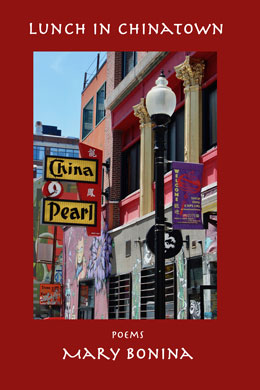
A fellow of the Virginia Center for the Creative Arts, Mary Bonina was finalist for the Goldfarb Fellowship
and awarded several residencies, including one at the VCCA retreat, Moulin a Nef, in Auvillar, France. Previous
publications include My Father's Eyes: A Memoir and two poetry collections—Living Proof and Clear Eye Tea, all from
ČervenÁ Barva Press. Her poems and essays have appeared in The Lowell Review, Hanging Loose, Poets and Writers,
Salamander, Mom Egg, Ovunque Siamo, Adelaide, and many other journals, and her work has been included in several
anthologies, including Entering The Real World, VCCA Poets
on Mt. San Angelo from Wavertree Press. Her completed
novel, My Way Home, is on submission to publishers. Her
poem "Drift" won Boston Contemporary Authors/Urban Arts
prize and is carved in a granite monolith, a permanent public
art installation in the City. Bonina has collaborated with
composers of arts songs and new music, a sculptor, and her
work has been translated into Japanese. She received a full
fellowship from the Vermont Studio Center. A voiceover
artist, she has recorded fiction, non-fiction, and poetry for
blind readers. She offers classes, workshops, conference
presentation, and individual coaching for writers. Bonina has
been a long-time member of the Writers Room of Boston,
where she served on the Board for more than a decade. She
earned her M.F.A. in Fiction Writing from the Program for
Writers at Warren Wilson College. She lives in Cambridge,
Massachusetts. Her website is www.marybonina.com
Description:
New from Mary Bonina—and particularly timely—LUNCH IN CHINATOWN is a poetry collection inspired by the
poet's work teaching the English language to immigrants from Haiti, China, Poland and other European countries, Central,
Latin American, and African nations, and others.
The poems highlight, as Patrick Sylvain, Professor of Global Studies, states in his introduction, "the universal nature
of human connection, understanding, and a sense of shared humanity in the face of cultural and linguistic differences"
Bonina sees her classes as offering survival skills,
and compares her necessarily improvised lessons to the act of writing a poem, "that familiar process of one word, one
thought, leading to another, often unanticipated one, recognizing endless possibilities, and finally settling on the
right one in a moment of revelation."
In this vivid, wonderfully empathetic book of
poems, Lunch In Chinatown, Mary Bonina is
an inquisitive seeker, not only set to teach
English but also to learn about the lives of her
immigrant students. There’s the student who
worked with the very ill and the job did not
allow wearing jewelry “without that ring on her
finger/her hand felt too light, made her
think/that she wasn’t in the world anymore,”
another puzzled over the same abbreviation
for Saint and Street, a young man recalled his
young love in Port au Prince. In her masterful
telling Bonina has given us glimpses of their worlds, both before and after
the immigration. These poems celebrate the common human language, of
disappointments and loss, aspirations and love, and also how poetry and
the resolve of students and their teacher can make all the difference in
the world.
—Pui Ying Wong, author of Fanling in October
In Lunch in Chinatown "Mary Bonina's eloquent verses breathe life into the seemingly mundane,
turning lunchtime into an exploration of the extraordinary moments hidden within our daily routines."
from the Introduction
Patrick Sylvain, P.H.D., M.F.A
Author, Unfinished Dreams/Rev San Bout (bilingual poetry)
Cover photo: Abbi Sauro
Author photo: Christopher Collyn
$16.00 | ISBN: 978-1-950063-88-8 | 27 Pages

Gloria Mindock is editor of Červená Barva Press. She is an award-winning author of six poetry
collections and three chapbooks. Her
poems have been published and translated into eleven
languages. Her recent book, Ash, was translated into Serbian by Milutin Durickovic and published by Alma Press in
Belgrade in 2022. Ash,
published by Glass Lyre Press (2021), won the International Impact Award,
the NYC Big Book Award, the Firebird Speak Up Talk Radio
Award, The Pacific Book Award, the International Award - The
Princess, Noble Poetry Skills, Art Club of Ragkonik in Smederevo,
Serbia, a Distinguished Favorite for the Independent Book Award,
and a Bronze Medal from the North American Book Award.
Other awards include the Allen Ginsburg Award for Community
Service by the Newton Publishing Center, the Ibbetson Lifetime
Achievement Award, the 5th and 40th Moon Prize from Writing
in a Woman's Voice, numerous Pushcart nominations and three
citations for Červená Barva Press as an editor and community
service from the MA House of Representatives.
Gloria's work recently has appeared in Gargoyle, The James Dickey Review, 10 x 10, Ibbetson, Growth: Journal of Literature,
Culture, & Art (Macedonia), KGB Lit, and others. Gloria was the Poet Laureate in Somerville, MA in 2017 & 2018. For more
information about Gloria Mindock, visit her website at: www.gloriamindock.com
Gloria Mindock's book touches the very soul of Ukraine. The elevated stylistics and exceptional talent of the author reveal
in depth all possible dimensions of the inhuman Russian aggression. This poetic diamond is a generalized universal message to the
world, it is also the call of the Ukrainian heart, and it is a resistance against Putin's obscurantism. It is a powerful expansion
of the senses that, through the depth of feeling, shows us that even in the darkest hour the human spirit does not stop resisting,
rising, denying violence and carrying with it the eternal light of revelation and freedom. The author has achieved the perfect balance
between the senses, reality, experience and emotion, and has reached the first literary sublimation of its kind; it is a book-message,
unique in spirit, an artistic achievement woven of pain, hope, suffering, empathy and philanthropy. Gloria Mindock's genuine work is
the poetic witness on the war. It sings the song of Ukraine. It hurts. It soars. It peaks. It rises above. This is the artistic blast
that will defeat and outlive the apocalypse of Putin and his bloody regime. Grief Touched the Sky at Night is a book that will wait
for peace and victory and then be read and studied for a long time.
-Svet DiNahum, author of Escape from Crimea, Winner of Červená Barva Press Dissident Award, Honorable Member
of the Ukrainian National Writers' Association
These stark, candid, and radiant poems in Gloria Mindock's new collection give shape and space to voices lifted from the
clutter and clamor that is the matrix of war. The war is upon us now, but poets forever have sung such lamentations and haunted
us all too often throughout history. One thinks of Homer, Wilfred Owen, and Carolyn Forche. A fierce and generous tenderness and
enviable humanity ungirds these unflinching poems. Mindock's is the voice we need to hear at this very moment.
-Eric Pankey, author of Not Yet Transfigured
Gloria Mindock's poetry collection was written during the living experiences of the war, which unfortunately, continue. The
language of the poems is direct and full of metaphors, understandable, but concrete and abstract at the same time. Abstract to
the point that the words war, blood, killing, loss, Bucha, and Kyiv are now in a line synonymous with a huge tragedy,
"My body is naked// I did not remove my clothes. My dignity remains //while the dirt covers me //I love my country.
//I love my country. //I am Ukraine" In the poem Boots, as if the name is of a Ukrainian soldier or refugee, the poet
presents an opposing understanding to create the maximum effect of doom and helplessness. But at the same time an inner
resistance and stubbornness are presented in its last lines, bearing witness to resolve and hope. In Mindock's poems,
despite the depiction of a modern-day apocalypse, the understanding exists that "Everyone needs to be protected, // to be loved."
Clearly the role of poetry hasn't lost its significance.
-Vasyl Makhno, author of Paper Bridge, Translated by Olena Jennings; with an introduction by Ilya Kaminsky
Cover photo: Natalia Zhurminskaya
$16.00 | ISBN: 979-8-9885737-3-9 | 71 Pages
Ash by Gloria Mindock from Glass Lyre Press
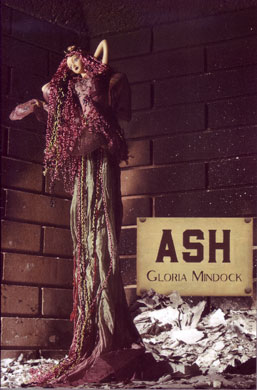

Gloria Mindock is the author of I Wish Francisco Franco Would Love Me (Nixes Mate Books), Whiteness of Bone
(Glass Lyre Press), La Portile Raiului (Ars Longa Press, Romania) translated into the Romanian by Flavia
Cosma, Nothing Divine Here, (U Šoku Štampa), and Blood Soaked Dresses (Ibbetson).
Widely published in the USA and abroad, her poetry has been translated and published into the Romanian,
Croatian, Serbian, Montenegrin, Spanish, Estonian, Albanian, bulgarian, Turkish, and French. Gloria has been published in
numerous literary journals including Gargoyle, Web Del Sol, spoKe, Constellations: A Journal of Poetry and Fiction,
Ibbetson, The Rye Whiskey Review, Muddy River Poetry Review, Unlikely Stories, Pratik: A Magazine of Contemporary
Writing and Nixes Mate Review and anthology. Gloria has been awarded the Ibbetson Street Press Lifetime
Achievement Award and was the recipient of the Allen Ginsberg Award for Community Service by the
Newton Writing and Publishing Center. She received the fifth and fortieth Moon Prize from Writing in a
Woman's Voice. Gloria was the Poet Laureate in Somerville, MA in 2017 & 2018.
In Gloria Mindock's powerful new book, the flames of love die out and the ashes linger until they dissolve into air.
The body is hostage, in charred relics of failed intimacies—The burnt-out ends of smoky days (T.S. Eliot).
There's beauty in the truth of Mindock's words and images: Things got smokier, battling the embers with//false waters.
And there's hope: Not everyone believes in destruction.// All the heart wants is to beat. Above all,
these poems radiate feeling, compassionately aware, attuned to a world of broken love that is burned beyond
recognition, the ashes drifting and settling: how much sorrow can this heart take?// There is never an answer.
Ash sears and sings.
—Dzvinia Orlowsky, author of Bad Harvest
In Ash, Gloria Mindock writes a gritty, beautifully haunting collection of poetry. Ash is what remains behind after
destruction, ruin, death, and burning. Similarly, the poems in this collection are what will remain. Fight the shadows
and wade through the darkness on a path paved by Mindock's vivid imagery, stark language, and dynamic voice, all of which,
make for a most memorable experience. Now more than ever, we need these poems. With the utmost economy of words, skillful
syntax, and emotional connections, each poem reverberates into the depths of your consciousness. Dark, intense, and wholly
unique, Ash, by Gloria Mindock is what you've been waiting for—a collection of poetry that consumes and smolders.
Are you ready?
—Renuka Raghavan, author of Out of the Blue and The Face I Desire
Gloria Mindock is a poet with singular vision: in Ash, a human heart is rolled out, then baked, then thrown to the birds;
broken crucifixes are shoved into junk drawers and gather dust; a spurned/murdered woman turns into a beautiful plant
that gives her ex-lover a rash. With mordant, Pinter-esque wit, Mindock explores just how far love, and even human
decency, can unravel—to the point of arson, to the point of war.
Ash begin with a series of poems about lethal house fires that may be literal or metaphorical ("my skin was burned by
your compulsion to be famous"), then expands to pinpoint the similar essence of human cruelty that enables soldiers to
kill. As the narrator of "Doomed by the Numbers" explains: "the fact is people will still go on brutally/killing each
other./Who will take my place and write about it?"
Ash concludes with an engaging, Rabelaisian roundelay of voices—mini-plays, summed up in just two stanzas, about
complicated relationships between two people.
Once again, with Ash, Mindock proves herself to be unafraid of the dark. She is truly a leading,
contemporary master of the edgy.
—Karen Friedland, author of Places That Are Gone and Tales from the Teacup Palace
Passionate and observant, Gloria Mindock is a tragic poet.
Her books are wounds revisited. She knows that nothing, never heals.
"With a rolling pin in my hand, I roll your heart out flat... stop it from beating.
The redness of blood turns to wax, sticky while wet." (Baked)
She senses the pain of the world in her being.
"The void looms deep, scorched like the desert blowing aimlessly." (Exit)
As her latest book Ash attests without doubt, Gloria is both a warrior and a martyr. Her words are
swords that slowly transform into tears.
Her anger at life's injustice is mighty, but mighty is her generosity and her openness towards repair, harmony and universal peace.
A must-read Ash conducts the reader through thorny labyrinths of pain and despair, allowing now and then a glimpse of ultimate
resolve and liberation in verses of a rare beauty:
"...but gravity is about to free me into space... People will look at me day and night and ask, "what is it?" There is no control
over what happens. The cathedral is high and my freckles fell on the floor as I left. Paleness now, that no one sees, but in
the universe, I will be a prism." (Gravity)
"...A hunger surrounds us, dust gathers, and is wiped off, space evading all this as songs of the wind come through the window
and we all hum." (Room)
—Flavia Cosma, author of In the Arms of the Father, Val-David, QC
$16.00 | ISBN: 978-1-941783-75-7 | 71 Pages
|
ABOUT THE PRESS
ČERVENÁ BARVA PRESS was founded in April of 2005.
The press solicits poetry, fiction, and plays from various writers
around the world, and holds open contests regularly for its chapbooks,
postcards, broadsides and full-length books.
I look for work that has a strong voice, is unique, and that takes risks with language.
Please see submission guidelines for current information.
I encourage queries from Central and Eastern Europe.

|

